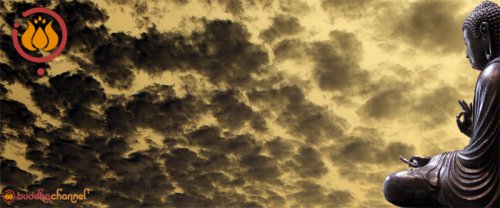
383
cut the stream.
Expel sensual passions.
Knowing the ending of fabrications,
brahman,
you know the Unmade.
384
to the beyond of two things,
then all his fetters
go to their end —
he who knows.
385
not-beyond or
beyond-and-not-beyond
can’t be found;
unshackled, carefree:
he’s what I call
a brahman.
386
absorbed in jhana,
his task done, effluents gone,
ultimate goal attained:
he’s what I call
a brahman.
387
by night, the moon;
in armor, the warrior;
in jhana, the brahman.
But all day and all night,
every day and every night,
the Awakened One shines
in splendor.
388
for having banished his evil,
a contemplative
for living in consonance,
one gone forth
for having forsaken
his own impurities.
389
nor should the brahman
let loose with his anger.
Shame on a brahman’s killer.
More shame on the brahman
whose anger’s let loose.
390
than when the mind is held back
from what is endearing & not.
However his harmful-heartedness
wears away,
that’s how stress
simply comes to rest.
391
in body,
speech,
heart,
is restrained in these three ways:
he’s what I call
a brahman.
392
you would learn the Dhamma
taught by the Rightly
Self-Awakened One:
you should honor him with respect —
as a brahman, the flame for a sacrifice.
393-394
by clan, or by birth,
is one a brahman.
Whoever has truth
& rectitude:
he is a pure one,
he, a brahman.
What’s the use of your matted hair,
you dullard?
What’s the use of your deerskin cloak?
The tangle’s inside you.
You comb the outside.
395
— his body lean and lined with veins —
absorbed in jhana,
alone in the forest:
he’s what I call
a brahman.
396
for being born of a mother
or sprung from a womb.
He’s called a ‘bho-sayer’
if he has anything at all.
But someone with nothing,
who clings to no thing:
he’s what I call
a brahman.
397
he doesn’t get ruffled.
Beyond attachment,
unshackled:
he’s what I call
a brahman.
398
cord & bridle,
having thrown off the bar,
awakened:
he’s what I call
a brahman.
399
insult, assault, and imprisonment.
His army is strength;
his strength, forbearance:
he’s what I call
a brahman.
400
duties observed,
principled, with no overbearing pride,
trained, a ‘last-body’:
he’s what I call
a brahman.
401
a mustard seed on the tip of an awl,
he doesn’t adhere to sensual pleasures:
he’s what I call
a brahman.
402
for himself,
on his own,
his own
ending of stress.
Unshackled, his burden laid down:
he’s what I call
a brahman.
403
in discernment, astute
as to what is the path
& what’s not;
his ultimate goal attained:
he’s what I call
a brahman.
404
by householders
and houseless ones alike;
living with no home,
with next to no wants:
he’s what I call
a brahman.
405
against beings fearful or firm,
he neither kills nor
gets others to kill:
he’s what I call
a brahman.
406
unbound among the armed,
unclinging among those who cling:
he’s what I call
a brahman.
407
conceit, and contempt,
have fallen away —
like a mustard seed
from the tip of an awl:
he’s what I call
a brahman.
408
what’s non-grating,
instructive,
true —
abusing no one:
he’s what I call
a brahman.
409
he takes nothing not-given
— long, short,
large, small,
attractive, not:
he’s what I call
a brahman.
410
and for the next world
can’t be found;
free from longing, unshackled:
he’s what I call
a brahman.
411
his homes,
can’t be found.
Through knowing
he is unperplexed,
has come ashore
in the Deathless:
he’s what I call
a brahman.
412
beyond attachment here
for both merit & evil —
sorrowless, dustless, & pure:
he’s what I call
a brahman.
413
— limpid & calm —
his delights, his becomings,
totally gone:
he’s what I call
a brahman.
414
this hard-going path
— samsara, delusion —
has crossed over,
has gone beyond,
is free from want,
from perplexity,
absorbed in jhana,
through no-clinging
Unbound:
he’s what I call
a brahman.
415-416
would go forth from home —
his sensual passions, becomings,
totally gone:
he’s what I call
a brahman.
Whoever, abandoning craving here,
would go forth from home —
his cravings, becomings,
totally gone:
he’s what I call
a brahman.
417
the human bond,
having made his way past
the divine,
from all bonds unshackled:
he’s what I call
a brahman.
418
delight & displeasure,
cooled, with no acquisitions —
a hero who has conquered
all the world,
every world:
he’s what I call
a brahman.
419
beings’ passing away,
and their re-arising;
unattached, awakened,
well-gone:
he’s what I call
a brahman.
420
— devas, gandhabbas, & human beings —
his effluents ended, an arahant:
he’s what I call
a brahman.
421
— in front, behind, in between —
the one with nothing
who clings to no thing:
he’s what I call
a brahman.
422
hero, great seer —
free from want,
awakened, washed:
he’s what I call
a brahman.
423
He sees heavens & states of woe,
has attained the ending of birth,
is a sage who has mastered full-knowing,
his mastery
totally mastered:
he’s what I call
a brahman.
Provenance: ©1997 Thanissaro Bhikkhu.
Transcribed from a file provided by the translator.
This Access to Insight edition is ©1997–2009 John T. Bullitt.
Terms of use: You may copy, reformat, reprint, republish, and redistribute this work in any medium whatsoever, provided that:
- (1) you only make such copies, etc. available free of charge;
- (2) you clearly indicate that any derivatives of this work (including translations) are derived from this source document;
- and (3) you include the full text of this license in any copies or derivatives of this work.
Otherwise, all rights reserved.
All the sutras HERE




